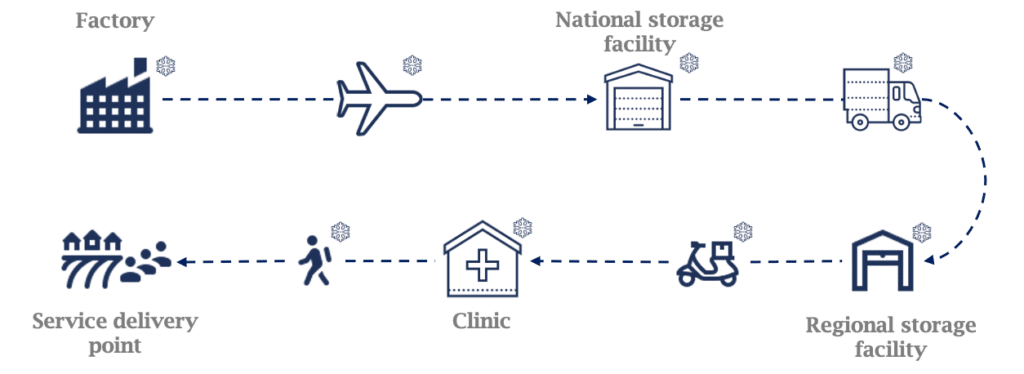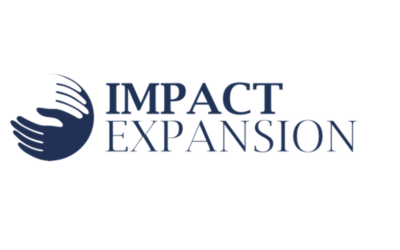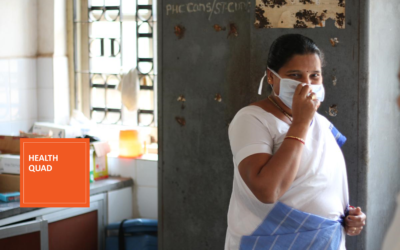The Covid-19 pandemic brought about impressive achievements in the world of vaccine research, with vaccines being developed at record speed. In the three months since the mass vaccination began, at least 240 million doses have been administered. While this brings hope of an end to the pandemic, ensuring that billions of people across the world get the vaccine will be a massive challenge. From securing enough supply, to enabling the fastest and largest vaccine roll-out yet, substantial support is critically needed from governments and the private sector alike.
The argument for supporting the Covid-19 vaccination could not be clearer. More than two and a half million people have lost their lives to the virus worldwide. In addition to this devastating human cost, every month without a vaccine costs the global economy US$375b.
So how can the private sector contribute to one of the most pressing challenges of our time?
Vaccine availability: ensuring that no one will be left behind
The global supply of Covid-19 vaccines is expected to fall short of demand in 2021. As a result, in many parts of the world, people may need to wait up to three years to get the jab, time during which the virus will continue to spread.
Most of the shortfall will impact low- and middle-income countries. This is partly because high-income countries, home to about 14% of the world population, have purchased 60% of doses to date through bilateral deals. In contrast, most low- and middle-income countries are relying on the COVAX facility. Through COVAX, 92 LMIC would get doses for free. Additionally, all countries, regardless of income level, would have equal access to vaccines at the same time. But COVAX has struggled to mobilise the support needed from donors to subsidise the facility, and is in need of US$6.8b in 2021.
Enabling the fastest and largest vaccine roll-out yet
Even if we succeed to bridge the funding gap for vaccine procurement, most countries will struggle with the delivery. In fact, few have the required capacity to accompany the unprecedented speed and scale of the vaccine roll-out. Countries are in urgent need of both technical and financial support to strengthen supply chains and introduce outreach campaigns to combat misinformation. Cold-chain equipment, storage and last-mile logistics remain three critical issues, especially in places without reliable electricity and refrigeration.
The road to vaccination

UNICEF has called for US$410m to help countries with the delivery of vaccines, therapeutics and diagnostic tools in 2021. UNICEF also estimates a funding gap of US$133m to cover in-country vaccine logistics and the required cold-chain equipment for the 92 poorest countries.
What role for the private sector in the Covid-19 vaccine roll-out?
1. The private sector can leverage its capabilities to provide in-kind support
Companies across the world are exploring how they can use their services, infrastructure and expertise to support the vaccine roll-out. In Washington State, Starbucks employees are supporting the government to improve the operational efficiency of vaccination sites. In Israel, IKEA is offering Covid-19 vaccinations in stores. Over 10 leading airlines have signed agreements with UNICEF to support the prioritisation of delivery of Covid-19 vaccines.
2. The private sector can provide crucial funding support
To bridge the funding gaps of key mechanisms, private funders will need to join forces with public donors and supply a substantial amount of financial support. To date, only 8% of the secured COVAX funding is coming from private and philanthropic donors such as Mastercard, TransferWise and TikTok. More is needed.
In addition to this much-needed direct grant support, the private sector can strategically use its funds to be catalytic and maximise the impact.
- Mobilise other funders by aggregating funding. The urgency and magnitude of the funding gaps call for a coordinated approach from public and private donors alike. Yet, many small-sized private actors may find it difficult to know how to best support the vaccine roll-out. By aggregating grant funding through a pooled fund or matching commitments, funders can mobilise more and bigger donations from diverse co-funders.
- Funders can provide concessional support to financially constrained private and public actors involved in the vaccine roll-out. Improving the efficiency of the vaccine roll-out requires investment in those public and private actors involved in its supply chain. However, securing funding for investment can be difficult, especially for small and medium sized actors in deprived sectors and geographies. With concessional financing, funders can support local actors to invest in their services to better meet the needs of the vaccine roll-out.
- Results-based finance. With traditional grant funding, funding is tied to inputs and not achievement of outcomes. In other words, funders have little guarantee that the intended outcomes will be met. Results-based finance can be an effective mechanism in improving accountability and outcomes per dollar spent on the vaccination support.
The way forward
KOIS is currently working with the multinational drink and brewing company AB InBev to explore how they can best support Covid-19 vaccination across their local markets.
We would like to use this opportunity as a call to action for other private and philanthropic actors that wish to support Covid-19 vaccination. The time to act is now.
For more information, please contact Colin Godbarge and Clara Marköö.
About the authors
Colin Godbarge is a Principal at KOIS Paris
Clara Marköö is an Analyst at KOIS Paris




